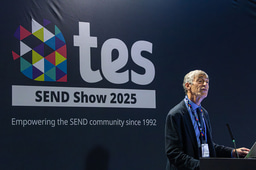
The SEND Review - Right Support, Right Place, Right Time was an opportunity to look at the wealth of evidence on how and why the 2014 SEND reforms did not work as intended, why so many children and young people with SEND have been left without suitable provision, and to put forward proposals to improve the system.
Hannah Moloney - a SENCO, consultant and researcher involved in the National SENCO Workload Surveys ( gives her verdict on key aspects of the SEND review.
Standardising processes – potentially good
It's not uncommon for SENCOs to work with several local authorities at any one time and find that they have different standards and expectations. Having a national standard should have a positive impact.
The review proposes to standardise and digitise Education, Health and Care plans and annual review documentation. With patient confidentiality and GDPR, sharing information between education, health and care can be complicated or ineffective. One way we have sought to address this is to have a signed letter from the parent-carer giving unrestricted permission to have information shared with us, which we then send with our request for information. However, this isn’t always successful.
The system has been inefficient and beset with problems. A lack of communication, a lack of mutual trust and different working practices between education, health and social care has meant that parents are still having to tell their story over and over again to make it available to all parties.
The proposals to introduce new local and national inclusion dashboards setting out clear performance data and metrics across education, health and care to strengthen accountability and transparency to parents; and to introduce new innovative tools for better data sharing across education and health partners, could be beneficial.
Reforms to funding – cause for concern
Currently funding is inconsistent. The green paper contains a recommendation that 'The national bands and tariffs would apply across the breadth of education provision in the SEND system, including places in independent specialist provision, providing a more consistent basis for commissioning and funding of provision.' The standardisation of the notional budgets in schools has potential to be good. But will funding even scratch the surface of what's required?
If what is described on paper comes to pass and is appropriately funded then I think it will be a positive move. However, the underfunding of SEND provision in recent years makes me cautious as to whether we will see meaningful change.
SENCO support – a missed opportunity
There is a continued recommendation that SENCOs be given sufficient protected time to carry out their role and are provided with dedicated clerical support to reduce the time they spend on administrative work.
At a national level, local authorities have been operating separately and with different standards from one another. There has been no consistency up to now.
Our workload surveys showed that the same is true at school level. For example, our 2018 survey showed that in average sized primary schools with an average SEND cohort, SENCOs received anything from no time at all to five days a week to do the role. This kind of inconsistency has a huge impact on the quality of support available for pupils. Our research made a very clear mandate for change, standardising SENCO time nationally.
The Department for Education has missed an opportunity to close an enormous loophole. In the SENCO workload survey of 2018, the testimonies of almost 2,000 SENCOs nationwide - just under 10% of the SENCO population - were clear and consistent. It found that 74% of SENCOs said they did not have enough time to ensure pupils on SEN support were able to access the provision that they need. Perhaps more worrying, 59% of SENCOs stated that they did not have enough time to ensure pupils with EHC plans accessed the provision that they required. We know that when statements are recommended rather than statutory, they are disregarded.
Training – may not be delivering the right skills
There is a significant shortage of specialists and that is recognised throughout the green paper. For example, there are not enough educational psychologists.
There is an opportunity with the national professional qualifications on SEND to develop the curriculum to include training for SENCOs in delivering or overseeing the delivery of a much more strategic approach to screening within their school. We know that early intervention is crucial to positive outcomes, so upskilling schools in initial screening will reduce demand on specialists, enabling them to focus on those with the greatest need, and will also allow class teachers to know and understand their pupils’ needs better.
Further training for Early Years SENCOs is great news However, we know from our research that Early Years SENCOs are far less likely to have time and additional pay for the responsibilities it brings so I would like to see greater protection and value of this important role. Will the green paper enable this?
Respecting SENCO expertise – disappointing
The SENCO is at the heart of a child’s experience of school but is not central to this green paper. There is a high turnover in teachers, social workers and medical staff and the SENCO is possibly the most consistent partner in the child's journey.
SENCOs are often the first point of contact. They meet with parents. They train teachers. They may manage the special needs resource budget within the school. They liaise with the local authority. They are often likely to be involved with safeguarding, with pastoral concerns, behaviour and sanctions.
They are critical to the whole process. If the green paper is to have the impact we all want, I would call upon the policy makers to listen again to the SENCO voice and protect the role with standardised, legally protected time.
The SEND green paper was published on 30th March 2022 and the consultation closes on 1st July 2022 at 11.45. Please read it and respond. https://assets.publishing.service.gov.uk/government/uploads/system/uploads/attachment_data/file/1063620/SEND_review_right_support_right_place_right_time_accessible.pdf
If you want a summary of the green paper, have a look at Lorraine Petersen's excellent synopsis https://lpec.org.uk/wp-content/uploads/2022/04/SEND-Review-Summary-Document-1.pdf





Please sign in or register for FREE
If you are a registered user on SEND Network, please sign in